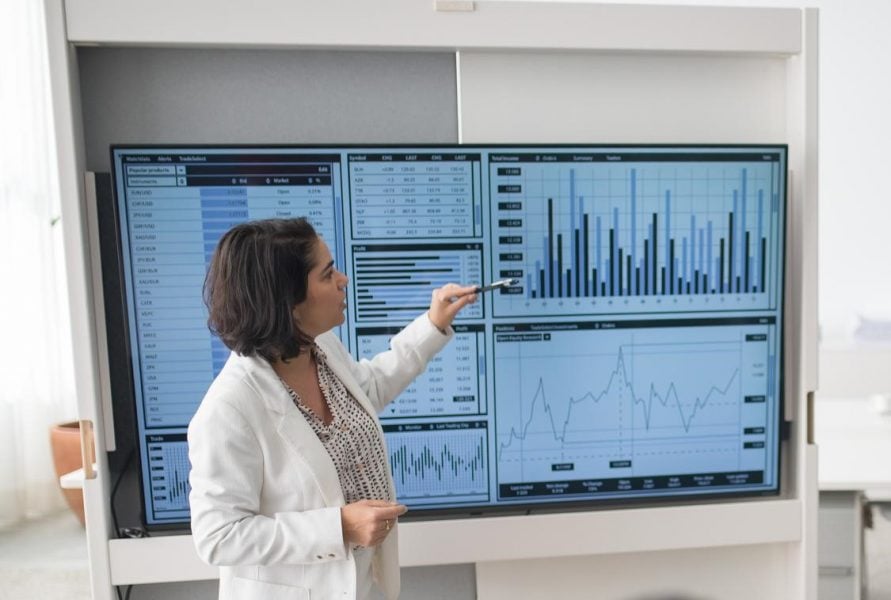Want to learn more about Michigan Tech’s online graduate programs. What sets them apart from the rest? Have the chance to speak to–and have the undivided attention of–program directors? Then drop by in Fall for a 45-minute Third Thursday virtual information sessions from Michigan Tech Global Campus.
These online webinars, which launched in March 2025, are continuing for the Fall 2025 semester. Previous sessions have featured other popular online graduate programs offered through Michigan Tech Global Campus. They were the Tech MBAⓇ, engineering management, civil engineering, manufacturing engineering, and geographic information science.
When you attend one of these sessions you will hear about
- key reasons for earning this certificate and/or degree from Michigan Tech
- exciting trends in the discipline and/or fields
- opportunities and career trajectories that an advanced degree could open up
- the online program’s content, structure, and course delivery
- important deadlines and program start dates
Advisors will also answer questions about admissions requirements and the application process.
First For Fall 2025: MTU’s Online Graduate Programs in Cybersecurity
In Fall 2024, the College of Computing launched the Online Foundations of Cybersecurity certificate. And they recently followed up with the Online MS in Cybersecurity.
These online graduate programs meet a pervasive and urgent demand. That is, in the last decade or so, cyber attacks have grown in sophistication, frequency, and size. In fact, according to US News, “Data breaches and ID theft are still hitting records.” Also, vehicle electrification, robotic workplaces, and Industry 4.0 offer new targets for cybercriminals and new challenges for cybersecurity professionals. And as organizations move to cloud environments and the IoT (Internet of Things) continues to proliferate, cybersecurity professionals must work even harder to safeguard infrastructures and predict possible vulnerabilities.
What all these changes mean is that there is a strong demand for cybersecurity specialists. According to Cyberseek, “employers in the private and public sectors deployed 514,359 job listings over the past 12 months.” These job listings were for cybersecurity jobs and adjacent technical positions with a heavy cybersecurity skills requirement. This BIG number is definitely good news: it represents an increase of nearly 57,000 listings, or 12%, over the previous 12-month reporting period.
These programs add to the roster of MTU’s already respected cybersecurity research program. In fact, the US National Security Agency designated MTU as a National Center of Academic Excellence in Cyber Research (CAE-R). This CAE-R designation extends through the 2029 academic year. Also impressive: MTU is a National Center of Academic Excellence in Cyber Defense (CAE–CD) as designated by the National Security Agency (NSA). MTU is the only university in Michigan that holds both of these designations.
You can get details about this program and speak to subject matter experts by dropping by on Thursday, Sept. 18, 2025, at 11:30 AM (ET).
On Deck for October: The Online MS in Applied Statistics
Alternatively–or maybe as well as--join us on Thursday, October 23 for an info session on MTU’s Online Master of Science (MS) in Applied Statistics. (Because of scheduling conflicts, this webinar was moved up one week.)
If you haven’t heard of this discipline, applied statistics is the practical use of statistical theories, methods, and tools to solve real-world problems across a variety of fields. These fields include science, engineering, business, healthcare, social sciences, and beyond. Applied Statistics, in short, involves gathering, analyzing, and interpreting data to uncover patterns, guide decision-making, and provide evidence-based answers to complex questions.
Today’s applied statisticians don’t just rely on traditional techniques. That is, they often harness the power of advanced tools like machine learning, predictive modeling, and big data analytics. These professionals work in a wide range of environments: from public health departments and research labs to tech companies, financial institutions, sports organizations, and universities.
For instance, in 2024, applied statisticians played a key role in managing supply chains disrupted by global instability. Take the Red Sea shipping crisis, which required companies to adapt. And fast. Companies such as Maersk and Amazon used predictive analytics and statistical modeling to reroute logistics and minimize delivery delays. By analyzing large datasets in real time—including shipping patterns, port capacity, and geopolitical data—statisticians helped reduce economic impacts and improve operational resilience.
When you attend this session, you’ll dive into this discipline. You’ll also learn how Michigan Tech’s Online Master of Science in Applied Statistics gives you the skills to meet the growing demand for data-savvy professionals.
Closing Out the Semester: MTU’s Online Graduate Programs from Mechanical and Aerospace Engineering
Mechanical engineering is undergoing a profound transformation, which is driven by rapid advances in aerospace engineering, digital technology, materials science, and systems integration. No longer confined to traditional roles in manufacturing or product design, today’s mechanical engineers are working at the crossroads of aerospace, AI, autonomous systems, robotics, energy systems, and biomedical innovation.
Also, the rise of smart materials, autonomous vehicles, and cyber-physical systems is blurring the lines between mechanical, electrical, and computer engineering. For instance, many engineers are now expected to master tools like finite element analysis (FEA), machine learning, and embedded systems. They might also need, at some point, to collaborate with data scientists, biologists, and software developers. In other words, mechanical engineering is becoming more interdisciplinary, connected, and critical to solving the world’s most complex problems.
MTU’s online graduate engineering programs have evolved with these changes. On Thursday, Nov. 20, subject-matter experts will unpack the details of the Online MS in Mechanical Engineering. They’ll also highlight other online popular graduate certificates, such as the Safety and Security of Autonomous Cyber-Physical Systems.
You’ll learn more about how you can choose a certificate or a degree that leverages both your previous experience and academic education.
Drop by at 11:30 AM. Bring your enthusiasm and your questions.
While you’re waiting, reach out to our friendly, knowledgeable Graduate Admissions Manager, Amanda, if you have any questions about these programs. She has years of experience helping students evaluate programs and navigate the application process.
Contact her at globalcampus@mtu.edu.


